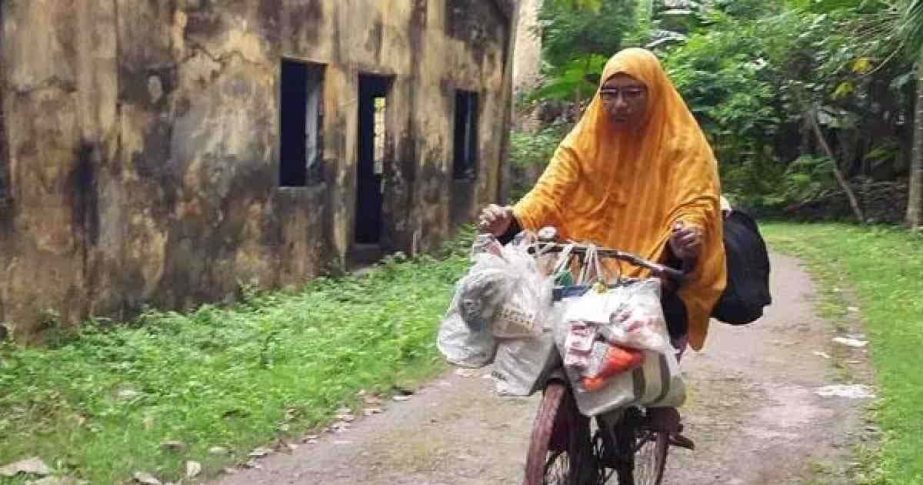
UNB, Khulna :
As the day winds down in Khalishpur, Muslima is finishing her daily route, going house-to-house ferrying goods on her bicycle. The goods are contained in multiple bags and cartons somehow attaching themselves on the front and back of her humble ride.
From a distance it may look like a small bazaar on the move, and wherever she stops is where the bazaar sits, as women of all ages quickly swarm to the spot and huddle around her. They bargain, they discuss, they learn about the products. In between, Muslima even manages to sell some of her items.
Her mark up on the final price at which she sells her items is very slender. She isn’t out to make an exorbitant amount in quick time. She knows she is in this for the long haul. And she will have to fight every day to survive in the battle of life.
Life wasn’t bad for Obaidur Rahman, approaching middle age as a worker of Daulatpur Jute Mill in Khulna. He and his wife never regretted not having a son among their three beautiful and talented daughters. Obaidur’s job at the mill was a source of security for them. As long as he held down his post, they had no reason to foresee any great strife in their lives ahead. That happiness ended in 2019, after he got diagnosed as a cardiac patient.
All of a sudden the blows kept coming for Obaidur. The jute mill was closed by the government in what looked like an overnight decision. As Obaidur was the only earning member of the family, their entire world changed overnight.
All three daughters were of school-going age, and moreover going to school as well. It meant whatever savings Obaidur had got quickly depleted.
Not only did he fail to meet their educational expenses, he was now struggling to provide food on their table.
It was all taking a toll on his health as wellDoctors recommended the stenting procedure for Obaidur, to insert little rings that open up the arteries for blood circulation, but it was unaffordable for him. Gradually Obaidur became more ill and fragile, and ultimately an invalid, incapable of working.
This is when the woman of the house, Taslima Begum Muslima (41) stepped up in a crisis to relieve the load on her husband. She started by selling clothes to the ladies of Khalishpur, winning their confidence by not compromising on quality and her honesty.
Initially, she sold women’s clothing including three-pieces that she carried in a bag slung from her shoulder. Later she bought a bicycle with her profit and expanded the product range into bangles, ribbons, gold plate earrings, rings, chains, combs and other necessary goods.
“I can’t do any heavy work. No one wants to employ me once they hear of my health condition. Now my wife is running the family,” Obaidur proudly told our correspondent.
Unfortunately, whatever Muslima earns is not enough to bear the educational expenses of their three daughters. So Obaidur would still appreciate wealthy people of the society to step forward to help his family, so that his daughters can have “the future they deserve.”
Shahanara Begum, a housewife of Khalishpur Housing Bazar, said she has known Muslima for 22 years.
“She is a pure soul. We would be very happy if any rich people or the governments invest in her,” Shahanara said gratefully.
Jaseda Rani Biswas, one of her loyal customers, said that Muslima always delivers with her top notch service and quality products.
“Since her husband fell ill, she sells goods from house to house and provides for her family,” she added.
Taslima Begum Muslima, the hero of the story said,” First I started selling women’s accessories with a bag on my shoulder, which led to severe back pain. Later I found out that the bones of my spine were permanently damaged.”
“So I had to buy a bicycle with whatever little savings I had. Every day, I sell products merely worth TK 100-200. It will be very helpful if anyone invests in me.”
Many people suffer from heart disease in Bangladesh. Most of the middle-income and lower income people among them, fail to bear the health expenses.
SM Kamrul Haque, head of the cardiology department of Khulna Sheikh Abu Nasser hospital, told UNB that there are 30 specialised beds at his medical facility dedicated to heart patients.
“Three and a half crore people of this region must depend on this facility here for cardiac treatment,” he said.
According to Dr Haque, ‘a life of excess’ that shuns the concept of control over one’s desires, is the surest ticket to developing heart disease. Eating too much, smoking too much, sleeping too much or conversely when it comes to exercising, which is a control function, you don’t do it enough.

